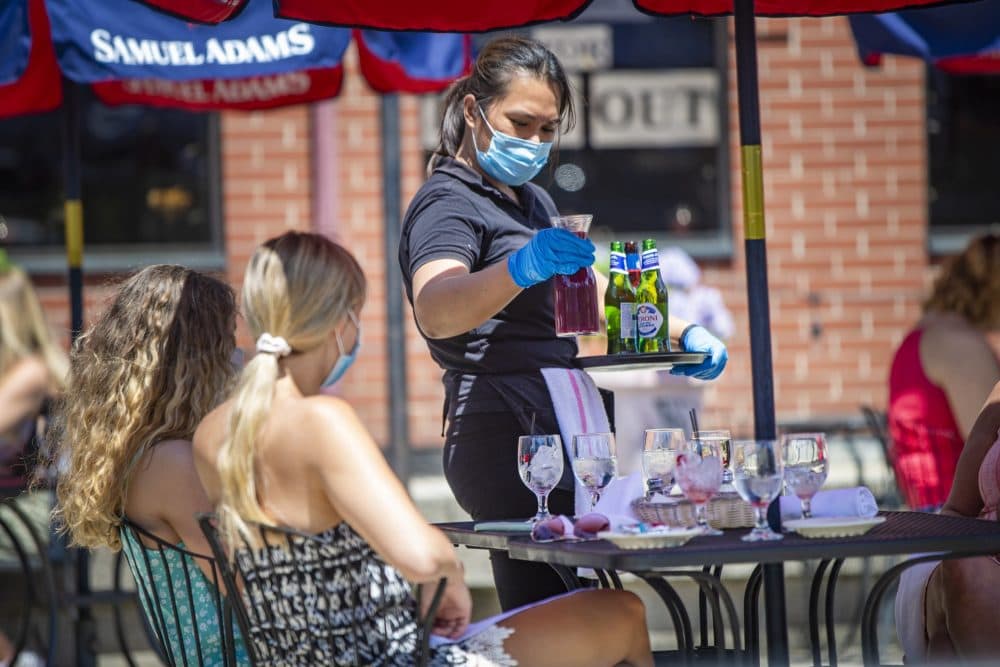Advertisement
Coronavrius Coverage
As Stores And Restaurants Reopen, Is It Hard To Decide What You Dare To Do? It's Not You

Dr. Steven Woloshin missed his mother. She’s at heightened risk if she catches the coronavirus because of her age. But he wanted to visit her — if it wasn’t too risky for her.
If anyone is capable of assessing those risks, Woloshin is: He’s a professor at the Dartmouth Institute for Health Policy and Clinical Practice, with a focus on helping patients understand the risks and benefits of medical decisions.
But even he found it hard. He thought of getting tested to be sure he wouldn’t endanger his mother. But he calculates in a New England Journal of Medicine paper that the testing is so inaccurate, it’s no guarantee of being virus-free — at least in places where the virus is widespread.
So — he has a lot of sympathy for everyday citizens trying to decide what they dare to do as Massachusetts and other hard-hit areas reopen. Do you go to that newly reopened store? Do you go out for dinner, even al-fresco?
If you're finding it hard to weigh your choices, experts on medical decision-making say: It's not you.
This combination of uncertainty and high stakes is like the perfect storm of anxiety.
Dr. Steven Woloshin
"There's a lot of uncertainty and it's really hard to act under uncertainty. And — the stakes are high," Woloshin says, particularly where vulnerable people are concerned. "This combination of uncertainty and high stakes is like the perfect storm of anxiety. So it's hard for all of us to make decisions, and know what to do."
This is not a new challenge in medicine — judgment without perfect knowledge. It comes up often in decisions about how to treat cancer and many other diseases that we know a lot more about than COVID-19.
"That’s what medical decision-making is all about," Woloshin says. "Because there are so many variables, and there's so much limited information that it's hard to be certain. And yet we have to act. And that's the challenge that clinicians face all the time."
But it’s new to everyone who’s making personal health decisions in a pandemic. And there’s an added wrinkle: your decisions affect not just you, but people who could catch the virus from you.
Advertisement
"So the decisions are intensely personal but also intensely societal at the same time, which is partly what makes it difficult," says Dr. Eve Wittenberg, a senior research scientist at the Harvard T.H. Chan School of Public Health.
She says some decisions, like visiting a relative, may affect only one or two people, "whereas going out to eat is different, in that it affects you, and it also affects the other people in the restaurant as well as, importantly, the workers in the restaurant. So there’s this two-sided bit for all of these decisions."
She understands the yearning for a simple formula to guide decisions, she says — something like: Take the prevalence of the virus in your area. Factor in the type of activity, and how high your personal risk is because of age and health conditions. Then do the math.
But we just don't have the data.
"That desire to have more precision on our risk is natural and reasonable," she says. "And it’s not something we can do right now. It’s really not."
At best, she says, we can put activities into buckets of low, medium or high risk, "and then think about me being exposed, other people being exposed, who’s taking this risk by choice, who’s not taking this risk by choice? Then I think we can sort of get some parameters, some boundaries on making decisions that will at least feel a little bit more satisfying than this completely, 'Who knows what to do? We’re all going to do something different.'"
And of course, these experts say, we can minimize risk by wearing a mask, washing hands, and following all the guidance from health authorities.
Carnegie Mellon Professor Baruch Fischhoff, a leading thinker on risk analysis, says struggling with these decisions is not a personal failure — it's an institutional one.
We’re all left to our own wits.
Prof. Baruch Fischhoff
With the stream of new decisions needed on how to deal with COVID-19, he writes in a recent JAMA piece, there should be rolling reports from a national scientific body providing much more help assessing the research and then helping people translate it into action.
Instead, "We’re all left to our own wits. There’s an enormous mobilization of the scientific community. But what the community is producing is not delivered to us in the form that we can use. And it’s confusing. It’s uncertain. It’s changing."
For example, he says, if parents are considering sending a child back to daycare, they want to know not just what’s being done to sanitize it, but what the residual risk is of going back. Without that, Fischhoff says, all you can do is look for the most reliable information available, "and then hope for the best. Try not to add the insult of regret to injury if things go bad."
And he says creativity can help. These days, instead of sit-down dinners with family members, he and his wife have what they call “stand-offs” at a distance in the backyard.
Dr. Steven Woloshin, who long worked with the late Lisa Schwartz on evidence-based decision-making in health care, added one more piece of data to his deliberations about whether to visit his mother: his mom's opinion.
"She’s very feisty, and she’s sort of a risk-taking person," he says, "and she said, 'Just come down and visit. I miss you."
So — taking precautions, of course — he will.
